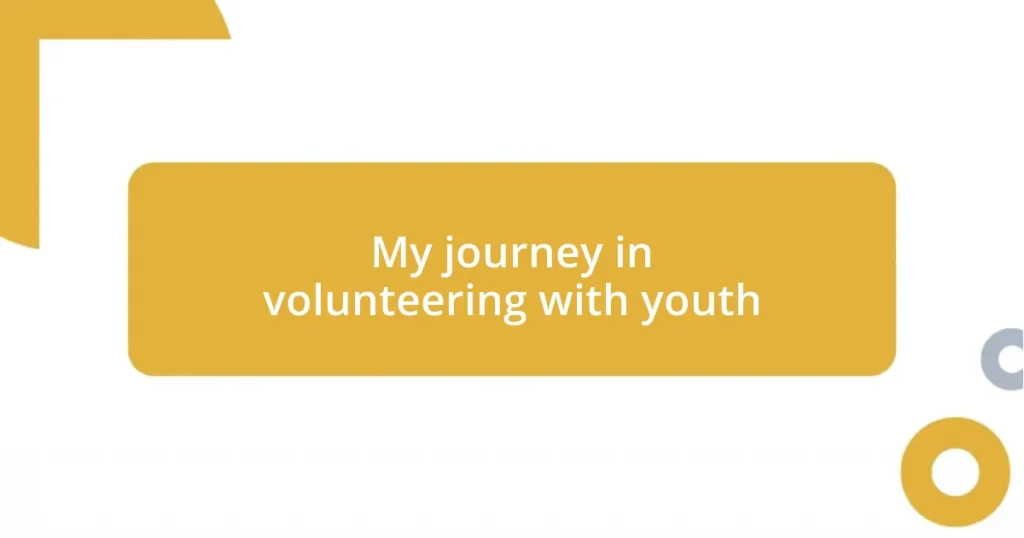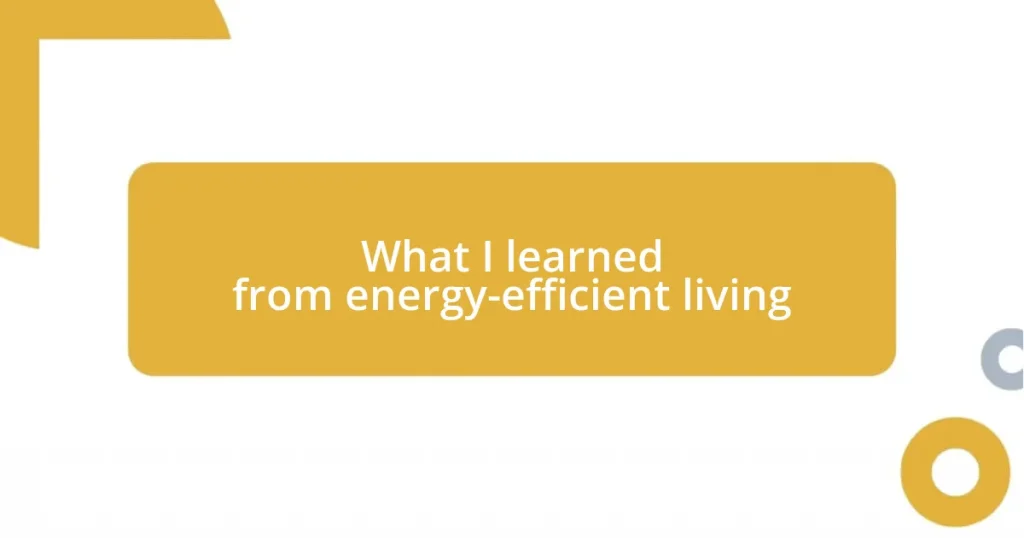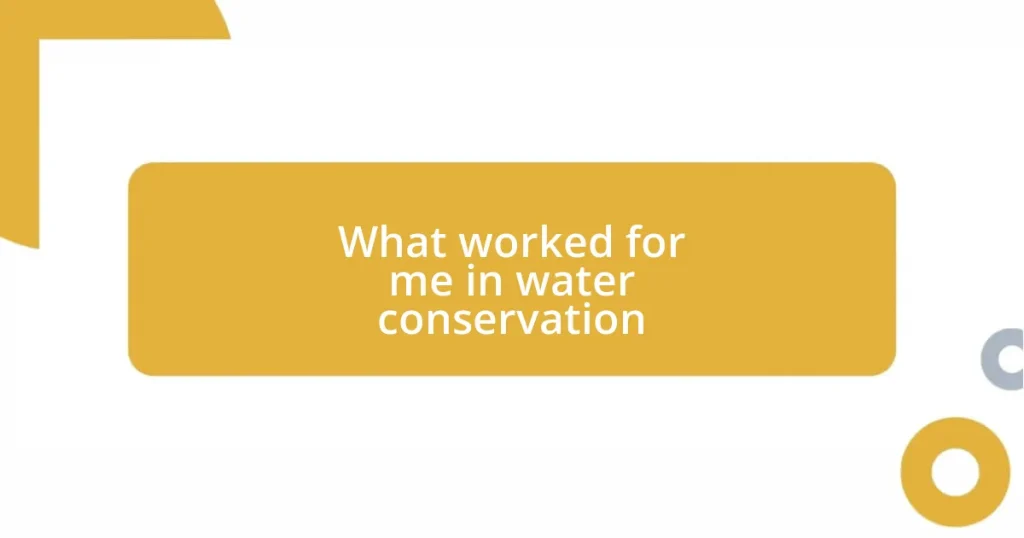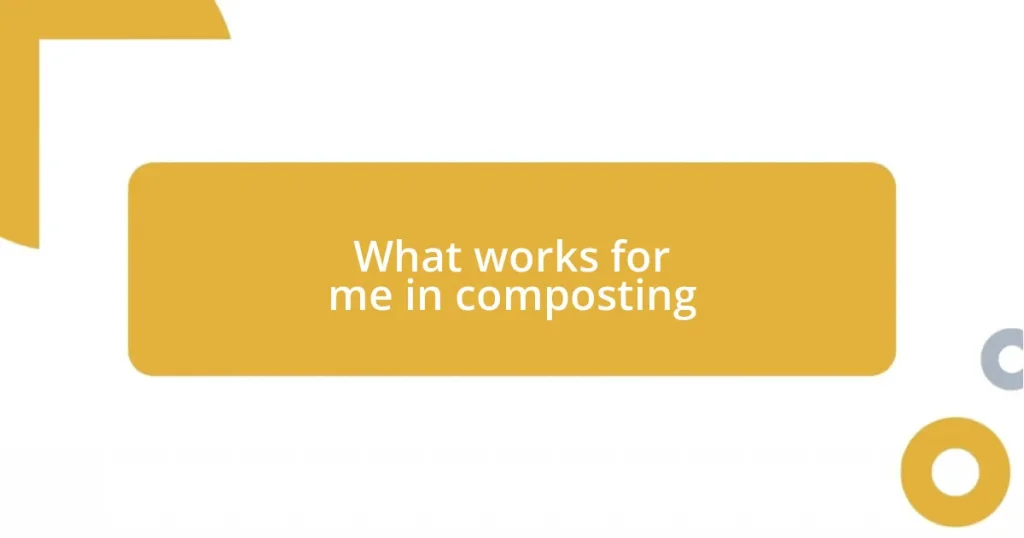Key takeaways:
- The desire to give back and transformative power of mentorship motivated the author’s youth volunteering journey.
- Building genuine relationships requires trust, patience, and creating safe environments for open sharing.
- Addressing community needs alongside personal passions enhances the effectiveness of volunteering efforts.
- Future plans include utilizing technology for engagement, fostering collaboration with organizations, and implementing feedback loops for continual improvement.

My motivation for youth volunteering
When I first started volunteering with youth, it was driven by a desire to give back. Growing up, I felt the transformative power of mentorship. I remember a local coach who encouraged me during my teen years, and I wanted to pay that forward. Have you ever experienced someone believing in you just when you needed it most? That’s the kind of impact I strive to have on young lives.
Every time I see a smile on a young person’s face after a successful workshop or event, it fills my heart with warmth. There’s something incredibly rewarding about seeing them grow in confidence and skills. I often reflect on how these moments are not just beneficial for them but deeply fulfilling for me, making me question: how can I not continue this journey of mutual growth?
The stories shared by the youth during our sessions resonate with me on a personal level. Hearing their dreams and challenges takes me back to my own journey, filled with uncertainty. Their experiences remind me that, despite the challenges, there is always hope and potential waiting to be unlocked. Isn’t it inspiring to think that by simply being present in their lives, I’m part of something bigger?

Finding the right volunteering opportunity
Finding the right volunteering opportunity often begins with understanding your own passions and skills. I realize that volunteering has to resonate with you personally; otherwise, it can become a chore. Reflecting on what experiences have moved me the most helps narrow my search. For instance, when I aligned my love for arts with educational engagement, I discovered a local program teaching creative skills to teenagers. The joy I felt during those sessions made it clear that I had found my niche.
Another important factor is considering the needs of the community. I remember attending an event where local youth shared their stories and what support they sought. Their honesty hit me hard—some were struggling with mental health while others just needed a safe space to be themselves. I took this to heart and realized that the right opportunity means not only feeling good about what I do but also truly addressing the gaps in youth support. Have you found moments when community needs and personal passion align? That’s when magic happens.
Moreover, it’s beneficial to explore various organizations before committing. I once tried a couple of different programs—from tutoring to leading sports activities—before finding where my skills and enthusiasm met the needs of young people. This exploration phase helped me understand what styles of engagement really suited me, making my volunteering experience much richer and more fulfilling.
| Opportunity Type | Personal Alignment |
|---|---|
| Arts & Creativity Workshops | Strong, aligns with my passion for creativity |
| Tutoring Programs | Moderate, needed more engagement |
| Sports Coaching | High, fosters teamwork spirit |

Building relationships with youth
Building relationships with youth is a delicate process that requires genuine interest and openness. I remember a moment when a shy teen approached me after a workshop, hesitating but finally saying, “Thank you; you really listened.” That simple acknowledgment reminded me that building trust takes time and patience. To me, it’s crucial to create an environment where they feel safe to share their thoughts—this is where true connection stems from.
- Show genuine interest in their lives by asking open-ended questions.
- Be consistent and reliable; it shows you care and are there for them.
- Share your own experiences and vulnerabilities to create a sense of relatability.
- Celebrate their achievements, no matter how small; it reinforces their self-worth.
- Encourage feedback to show you value their input and perspective.
I’ve learned that relationships flourish when the youth see you as an ally rather than just an authority figure. Early on, I noticed that some participants opened up more during informal gatherings over snacks than in structured sessions. It taught me the importance of creating spaces where connection can happen naturally. Just by sitting beside them, engaging in casual conversation, or sharing a laugh, I began to break down barriers. It’s in these moments that the real magic occurs.

Skills developed through volunteering
Volunteering has undeniably shaped my skill set in ways I hadn’t anticipated. One element that stands out is communication. Early on, I found myself leading a workshop where I had to break down complex concepts into simple ideas for the teens. It wasn’t just about relaying information; I had to connect and engage with them. Moments like those taught me how adaptability in my communication approach can spur genuine understanding and interest. Have you ever realized that the way you express yourself can create a ripple effect in someone else’s learning?
Another skill I developed is empathy, rooted in simply being present with the youth I work with. There was a time when I witnessed a young girl visibly struggling during a group activity. Instead of moving on, I sat with her and asked what was bothering her. That brief, intentional moment turned into a deep conversation about her challenges and dreams. It struck me how vital it is to truly listen and make space for emotional honesty. This experience reinforced my belief that empathy isn’t just a soft skill; it’s fundamental in fostering a supportive environment.
Time management might seem trivial, but it became crucial when juggling my various volunteering commitments. I remember weeks dedicated to planning a community event that fell on the same day as my other engagements. I had to organize every detail meticulously while ensuring I maintained a balance with my personal life. Learning how to prioritize what truly mattered made me more efficient. Have you ever found that sometimes, it’s the small organizational strategies that help you thrive amid chaos? In volunteering, I’ve discovered that every skill I develop echoes back into my own life, enriching it in unexpected ways.

Challenges faced in youth volunteering
When I first dove into volunteering with youth, I anticipated challenges, but some caught me off guard. For instance, gaining the trust of young people requires a lot of vulnerability on my part, too. I remember a specific evening where I attempted to facilitate a discussion, but the room was filled with silence. It struck me that they were hesitant, perhaps afraid of judgment, mirroring my own fears. Funny how we often forget that discomfort is mutual, isn’t it?
Another hurdle emerged through the unpredictability of youth emotions. One day, I had prepared an engaging activity, thinking it would spark inspiration. Yet, halfway through, a participant broke down in tears, triggered by personal issues that surged suddenly. That moment was a reminder about the importance of being adaptable. I learned quickly that sometimes the most significant impact we can make happens in unstructured moments, where we pause and offer genuine support instead of sticking to a predefined agenda.
Time constraints also posed significant challenges in my volunteering journey. Balancing my commitments often felt like walking a tightrope. There were times when I couldn’t dedicate enough time to prepare for activities, which led to less-than-ideal sessions. I still think about the week I rushed through organizing a session, only to realize I didn’t fully connect with the teens. It’s hard to engage when you’re not fully present, isn’t it? That experience taught me the value of quality over quantity, emphasizing that our time spent with youth should be intentional and meaningful, even if it’s brief.

Impact assessment of my volunteering
Assessing the impact of my volunteering experience has been an eye-opening journey. One day, after wrapping up a mentoring session, a young man approached me and expressed how my guidance on setting goals helped him find clarity in his life path. Hearing him articulate his newfound confidence was incredibly validating, reminding me that small conversations can lead to significant changes. Have you ever realized how the simplest exchanges can leave a lasting impression?
The feedback I received from both the youth and fellow volunteers painted a vivid picture of my influence. During a reflection session, a participant noted how our discussions encouraged her to break away from negative thought patterns. It struck me that my presence, coupled with active listening, created an atmosphere where she felt safe to explore her feelings. Isn’t it profound to think that sometimes all someone needs is to feel seen and heard?
Moreover, I discovered the importance of evaluation in understanding my contribution. After conducting a brief survey among the teens, it became clear that many valued the supportive community we had built. This not only highlighted the role of emotional safety in fostering growth but also inspired me to refine our activities based on their feedback. Knowing that my efforts resonated with them fueled my passion for volunteering even further. Have you ever considered how vital it is to truly listen to those you aim to serve? It’s a game-changer, I assure you.

Future plans in youth volunteering
Making future plans for youth volunteering excites me. I’ve been considering how to incorporate technology to engage the younger generation more effectively. Imagine a virtual mentorship program where youth can connect with mentors worldwide! I’ve seen firsthand how digital platforms can break down geographical barriers, allowing us to reach those who might otherwise feel isolated or unheard.
I also want to explore collaborative events with local organizations, combining resources and ideas. There was that one event I attended where various groups came together for a community service day. The energy was contagious! Sharing ideas and experiences sparked so much creativity and inspiration among everyone involved. It left me pondering – how much more could we achieve by continuously pooling our efforts?
Lastly, I’m keen on implementing regular feedback loops to keep improving our programs. Reflecting on past experiences, I remember a workshop where we forgot to ask for feedback until well after it ended. The insights we missed out on could have enhanced the next event significantly! I’m convinced that consistently inviting youth to share their thoughts can foster a sense of ownership within the programs, making them feel even more invested. Have you thought about how inviting that dialogue could change the dynamic of community engagement?















